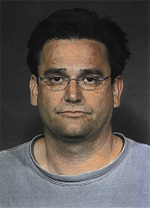ID theft allegations haunt founder of ID theft fraud protection service

This morning on the Howard Stern radio show, 'Baba Booey' came into the studio to help with a live commercial for Lifelock, an identity theft anti-fraud service that makes an eye-opening guarantee to its customers.

It turns out, according to the article, that Lifelock was founded by a man facing allegations of, get this, identity theft.
The story is a sordid tale of bankruptcies, arrests, media manipulation and the fact that users essentially give up all their sensitive personal information to a company founded by a man who is accused of hijacking his father's identity to run up a debt.
The money quote:
American Express sued Maynard's father in 2005 for $154,000 in unpaid bills. But Dr. Robert J. Maynard Sr., a prominent local eye doctor, denied he ordered the card.
Records show that someone with Maynard Sr.'s personal information ordered the card. But that someone didn't have the bills sent to Maynard Sr.'s home. Instead, the bills went to a company called Netshield, at a Phoenix address used by one of Maynard Jr.'s former firms.
Though Maynard Sr. says he never asked for the card, he settled with the company. Coincidentally, Maynard Jr. has $170,000 in debt to American Express listed on his 2005 bankruptcy paperwork — and his father is named as a co-debtor. If Maynard Jr. ordered the card using his dad's data, without his dad's knowledge, that would make him — you got it — an identity thief.
Of course, his father could have lied to American Express. Perhaps, Dr. Maynard ordered the card for his son.
But that's not what Dr. Maynard tells New Times.
The elder Maynard says he's still in litigation on the matter and cannot fully comment. But asked whether Maynard Jr. used his dad's identity to obtain the card, Dr. Maynard, who says he hasn't spoken to his son in more than two years, replies, "I can't disagree with that."